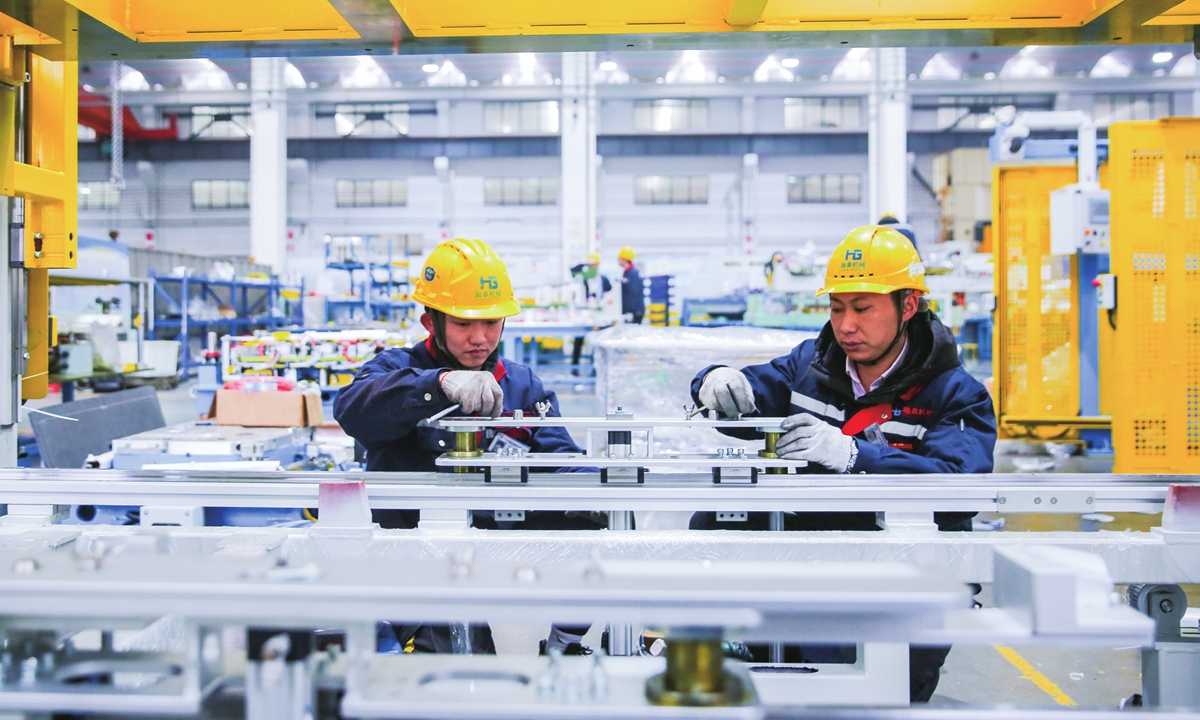
Workers rush to produce a batch of auto parts for clients in Poland at a company in Nantong, East China's Jiangsu Province on January 22, 2024. As the country promotes high-quality development, a number of auto parts makers have provided high-quality products to hundreds of domestic and foreign enterprises. Photo: VCG
Editor's Note:After the US imposed the unjustified 100 percent import tariffs on Chinese electric vehicles (EVs), the EU followed suit by unilaterally imposing a provisional tariff of up to 38.1 percent on Chinese EVs. The move has been met with rising criticism and opposition from European automakers, industry experts, and a number of government officials, who say that protectionism will only undermine the bloc's industrial and economic progress.
In an interview with Global Times reporter Ma Tong (GT), former Deputy Prime Minister and Minister of Economy of Poland Janusz Piechocinski (Piechocinski) criticized the EU's levying extra tariffs on Chinese EVs and highlighted the importance of maintaining dialogue and cooperation with China.
GT: What's your take on the latest EU decision to impose additional tariffs on Chinese-made EVs? Do you think the move will disrupt China-EU economic and trade ties?Piechocinski: The US imposed tariffs on Chinese goods a month earlier, followed by the EU's decision. However, the West appears to have overlooked its significant import volume of industrial elements and components from Asia, particularly China. A classic car comprises over 30,000 parts and components, with only 40 percent manufactured within European countries.
Let's also not forget about the bloc's access to aluminum, rare metals, semiconductors, and other critical elements. If we were to start trade wars, are we fully aware of the consequences regarding the availability of all these elements?
Suffice it to recall the industry's reaction to EC President Ursula von der Leyen's announcement to launch anti-subsidy investigations into Chinese EVs in September 2023 during the World Expo in Munich, with the European Automobile Manufacturers' Association (ACEA) approving the potential sanctions.
However, the probes sparked widespread opposition within the European automotive industry from the outset. As Europe's foremost automotive manufacturing powerhouse, the German government and the largest industry players in the bloc particularly distanced themselves from decisions on customs duties.
I view the imposition of duties on Chinese EVs with pessimism. In the mid-1970s, when Korean and Japanese automobiles entered Europe, similar competitive pressures arose, leading European countries to respond with tariff hikes. But what were the outcomes? Final buyers in these countries suffered much higher car prices.
At a meeting during the car exhibition at the Poznan International Fair - the biggest industrial fair in Poland, I questioned senior managers of European automotive companies about their strategies for competing with Asian rivals, at a time when not only BYD opens assembly plants in the EU. New Tariffs?
In my view, the EU's focus should ultimately shift towards improving the production efficiency and quality of its own auto products, rather than instigating trade wars with its second largest trade partner.

Janusz Piechocinski,former Polish deputy prime minister and economy minister Photo: Courtesy of Janusz Piechocinski
GT: Some media reports have suggested that with the claims of Chinese new-energy "overcapacity" and introduction of extra EV tariffs, the EU has opened a new front in its competition with China. Do you agree?Piechocinski: The US and the EU missed out on incredible changes in the EV sector over the past years. While the West focused on the premium segment, aiming for higher margins, China, home to 400 electric car manufacturers, targeted consumers with lower economic conditions to tap into new markets.
Let's remember that Western auto leaders, including Tesla, Mercedes, and VW have established factories in China. For instance, Mercedes produced nearly 2 million cars worldwide in 2023 and sold over 750,000 of them in China.
How can you be offended by China for having excessive production capacity when you are vigorously producing and selling your own auto products in China? How can you be offended by BYD for overtaking Tesla on a global scale, given Tesla's immense production and consumption potential in China alone?
Should China respond in the same way by saying, "Reduce your high production and sales in the Chinese market, otherwise we will launch investigations into your products?" Should China use the same approach as the West to encourage its neighbors, such as the Association of Southeast Asian Nations (ASEAN) countries, not to produce or import EVs, as competitors' products are more globally competitive?
GT: How do you view the potential impact of the EU-imposed tariffs on China-Poland cooperation? And what endeavors could be done to ease the trade tensions?Piechocinski: Poland and the whole of Europe should engage with China not only in what we have in common, what we can do better, and how we can reap mutual benefits in the modern world by respecting our partners. Starting the conversation with restrictions rather than focusing on constructive dialogue will hinder progress toward problem-resolving, and will not lead to a better future for both sides.
Competitiveness in the global market is not achieved by closing borders and assuming that China, our current partner will take no action to respond. As a result, the escalating actions taken by both sides will not solve the problem but will only exacerbate tensions.
Around 40 percent of the production cost of an electric car lies in the battery, and if Chinese companies, such as Contemporary Amperex Technology Co (CATL), have already launched the production of great batteries that are half the price of the existing models, how can we increase Western automakers' competitiveness by placing more expensive Western-made batteries in Western EVs?
In 2022, Poland surpassed the US to become the world's second largest producer of lithium-ion batteries, behind only China - China accounted for 70 percent of the world's battery cell manufacturing capacity, with Poland coming in second at 6.7 percent.
It is impossible to maintain Poland's position if we do not develop by strictly limiting the increase in production costs and enhancing production efficiency and effectiveness. In the realm of parts and components for classic cars, Poland is emerging as a dominant force in European production.
We also aim to boost the efficiency and productivity of the sector with the participation of Chinese companies, keeping pace with technological advancements, particularly in the electricity industry. Once again, together, we can achieve more; by standing opposite each other we are wasting time.
GT: How do you view the current state and prospects of the Chinese economy? What are the opportunities the Chinese market will offer for foreign businesses, including those from Poland and the broader EU?Piechocinski: China, the world's largest factory has amazed everyone with its remarkable development over the past decades. China is becoming a global leader not only in the traditional industrial sectors but also in sectors of cutting-edge technologies, process automation, as well as the field of efficient and optimized energy utilization with a growing share of renewable energy sources.
Let's examine China's energy sector -- it leads in wind, hydro, hydrogen, and solar power. The same can be said for the electric cars. Moreover, let's look at the country's transportation systems, information technology, and AI widely adopted, making significant strides in technology and innovation with a surging number of patents.
Today, every reasonable observer expects a minimum of 5 percent economic growth in China in 2024, as the country's economic status means not only substantial exports but also promising domestic market demand, which will also offer vast business potential for foreign enterprises.
In this context, China is set to remain the powerful engine of the global economy. Trade conflicts with China could diminish demand and limit opportunities for trade expansion. We need more cooperation and less confrontation, more practical dialogue aimed at solving rather than aggravating issues through protectionist measures.





